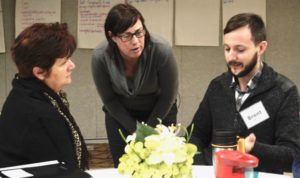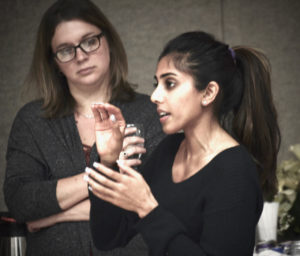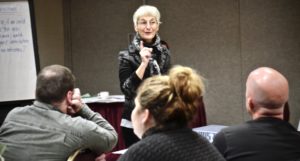|
Getting your Trinity Audio player ready...
|
The Underground Studio at THEMUSEUM in Kitchener has an important objective: introduce kids to the crazily creative world of coding, hacking solutions and 3-D printing, and sharpen an interest in STEAM careers (science, technology, engineering, arts and math).
But it’s a new program. How will it measure success? How will it know when it needs maintenance?
What does evaluation really mean?

Those sorts of questions brought Brent Wettlaufer, THEMUSEUM’s makerspace coordinator, back to school Oct. 25-26, specifically to Capacity’s Canada’s EvalU session in Stratford.
“My background is in science,” Wettlaufer said at the end of the session. “When I think of evaluation, I think of the quantitative: I think of things you can measure numerically.
“But with a social program like the Underground Studio, qualitative measures are very important, because they paint a more holistic picture of what we’re trying to achieve.”
So, after a day and half of working with EvalU faculty Julie Witmer and Catherine Lang, and “classmates” from seven other organizations from across southwestern Ontario, Wettlaufer left with a head full of ideas about how to demonstrate the difference THEMUSEUM’s Underground Studio makes in the community.

At the mention of the word, evaluation tends to leave overworked, under-resourced social-service organizations weak in the knees. Funders, from government ministries to ma-and-pa donors, want statistics to show whether their support contributes to positive, visible change.
But EvalU’s Stratford session, and its first class last year in Waterloo Region, emphasized that proper evaluation has more to do with soul-searching than number-crunching. It gets to the core of why an organization exists, and whether the organization is meeting its mission.

When it becomes part of the culture of an organization, evaluation points to needed course corrections sooner than later.
“People need to understand why they do the work they do, and what their activities are contributing to,” Witmer said in an interview. “In order to know what impact they’re having, they need to be able to ask critical questions and learn and reflect. Evaluation is one of the tools they can use to do that.”
Many organizations collect tonnes of data, Lang added, but they may not know how to filter out the noise to use data effectively for evidence-based decision-making. As a process of continuous learning, evaluation illuminates “what we need to improve on and how we can use strategies to address these things.”
Small and large organizations approach evaluation in different ways, she said. But they are driven by the same goal.
“We’re all struggling in complex and changing times to figure out whether we’re doing the right things,” Lang said.

